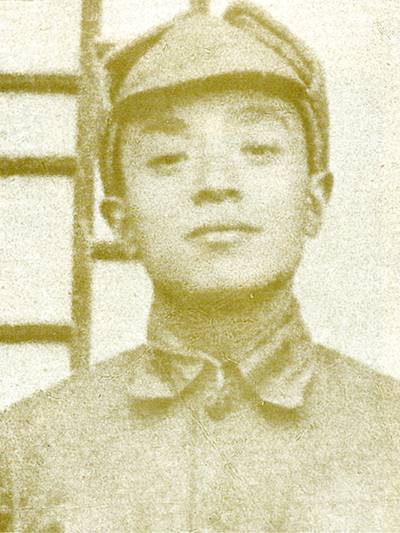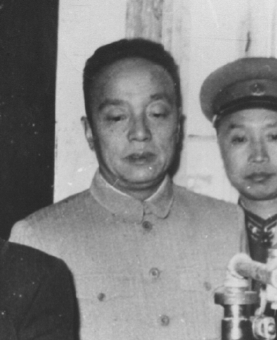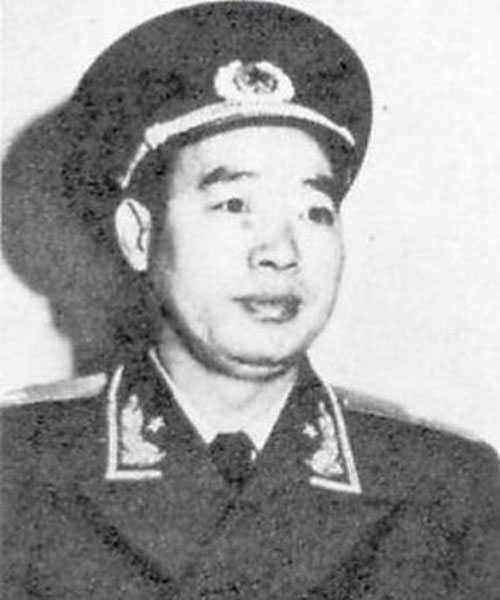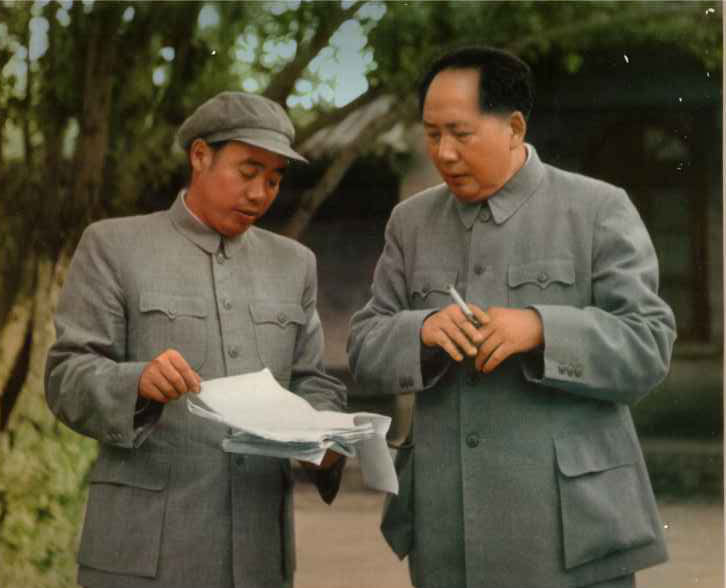<Back to Index>
- Member of the Central Committee Yang Shangkun, 1907
- Commander of 8341 Special Regiment Wang Dongxing, 1916
PAGE SPONSOR


Yang Shangkun (5 July 1907 – 14 September 1998) was President of the People's Republic of China from 1988 to 1993, and was permanent Vice Chair of the Central Military Commission. He was married to Li Bozhao in 1929, one of the few women to participate in the Long March, as did Yang.
Yang was born in Shuangjiang, Tongnan County, near the city of Chongqing in Sichuan, and studied at Chengdu Higher Normal School and its affiliated secondary school in 1920 - 25, and then returned to Chongqing. His older brother, Yang Yangong was one of the founding Executive Committee members of the CCP in Sichuan, and undoubtedly had an influence on Yang Shangkun’s ideological orientation. After joining the Communist Youth League (1925) and CCP (1926), he enrolled in Shanghai University, which in combination with his later study in Moscow, made him one of the best educated of the early party leaders. In the USSR, Yang studied at Moscow Sun Yat-sen University; students such as Yang were later characterized as the 28 Bolsheviks.
The original intention of the Comintern after sending him back to China was to have him help Wang Ming, but during the Long March, Yang defected to Mao Zedong's camp by supporting Mao at the Zunyi Conference, thus earning Mao's trust. Since Wang Ming's policy caused catastrophic failure for the Chinese communists, the Comintern was forced to accept the leadership change of the Chinese Communist Party, but unwilling to let Mao and other local factions take control, the Comintern appointed a new leader of the Chinese communist party Zhang Guotao, a former political rival of Wang Ming, but was still Soviet - trained and much more pro - Comintern than Mao and his followers who had never been to the Soviet Union. Yang Shangkun and other communists who were trained in the Soviet Union were ordered and expected to support this new appointee who once opposed Wang Ming.
However, the hope of the Comintern was crushed once again when many of the former Soviet trained Chinese communist cadres such as Yang Shangkun and Ye Jianying once again supported Mao instead of the appointee the Comintern had preferred. During the latter stage of the Long March, Yang was with Zhang Guotao's force, because the Comintern preferred Zhang over Mao and hoped the Zhang would have support from the Chinese communists who were in the former Soviet Union. However, Yang defected again to Mao Zedong's side when Zhang Guotao and Mao Zedong disagreed on the destination and Zhang led his force to the south. After Ye Jianying fled Zhang's headquarter with all of the maps and code books to Mao's camp, Yang and another colleague also fled from Zhang Guotao's headquarter with top secret documents, and they were forced to hide in order along the way to escape Zhang's cavalry sent to capture them, and eventually made it safely to Mao's headquarter with these important documents from Zhang's headquarter, and thus Mao's trust in Yang Shangkun was further strengthened. However, Yang's wife was forced to march with Zhang's force and the couple did not reunite until years later when Zhang's force finally returned to the communist base in Shaanxi after Zhang's disastrous failure which cost 75% of his force.
He held a senior position in the Central Committee of the Communist Party of China (CPC) from 1956 to 1966, but lost Mao's favor when he voiced his opposition to Mao's policy and supported Liu Shaoqi and Deng Xiaoping in their attempt to salvage China from the depths of the Great Leap Forward movement after witnessing the disastrous result of Mao's Great Leap Forward. As a result, Yang Shangkun was demoted during the Cultural Revolution, during which he was beaten by the Red Guards, and he was accused of planting covert listening device to spy on Mao, the same accusation shared by Deng Xiaoping,
and he was not rehabilitated until 1978, after which he was elected to the
Politburo in 1982. Such experience only strengthened Yang's support for
economic reform as well as his friendship with Deng Xiaoping, but in comparison to Hu Yaobang, Zhao Ziyang, Wan Li, Hu Qili and
other reformers, Yang was far less enthusiastic about political reform.
However, Yang's attitude of aggressive support for the Chinese economic reform and his conservative stand against the political reform at the same time just fit perfectly with Deng Xiaoping's view and, thus, earned him further trust from Deng. Many critics of Yang
accurately point out that one of the main reasons of his strong support of the Chinese economic reform is
that his children were assigned important posts in those state owned
enterprises that monopolized the particular market segments in the areas
they dominated, and thus benefited hugely from the economic reform,
accumulating great wealth via legal means, thanks to the state run
monopoly.
In 1988, Yang was appointed President of the People's Republic of China. Under the constitutional conventions of the 1982 Constitution, the President's role was largely symbolic, with formal executive power wielded by the General Secretary of the Communist Party of China and the Premier. In practice, state and party leaders still deferred to paramount leader Deng Xiaoping.
However, Yang's role during the Tiananmen protests of 1989 caused a fundamental shift in this arrangement. Yang was at first sympathetic to the students and he sided with Zhao Ziyang. As the PRC president and the vice chairman of Central Military Commission, he even praised Zhao's decision by claiming that “[Zhao] Ziyang’s notion of pacifying the student movement through democracy and law is good and seem quite workable right now.” His nephew, Yang Jianhua, commanded the highly disciplined 27th Group Army, which was brought in from Hebei province to suppress the demonstrators.
Extremely influential in the People's Liberation Army, he was removed by Deng Xiaoping in 1992 for attempting to replace Jiang Zemin as party leader. He was succeeded as President by Jiang Zemin.
He is considered as one of the Eight Immortals of Communist Party of China. He is a cousin of Yang Baibing.


Wang Dongxing (9 January 1916, Yiyang County, Jiangxi - 21 August 2015, Beijing) was Mao Zedong's principal bodyguard during the Cultural Revolution.
He served as commander of the 8341 Special Regiment, Mao's personal elite bodyguard force, but was dismissed by Mao for excessive protection, and sent to a labor reform camp. He later was reinstated. Wang Dongxing was instrumental in the coup d'état against the Gang of Four immediately after Mao's death.
He was prominent under Hua Guofeng, being one of the five members of the Politburo Standing Committee of the Communist Party of China, a committee whose membership varies between 5 and 9 and includes the top leadership of the Communist Party of China. He lost power as Deng Xiaoping rose to supreme power and was deprived of all his posts in the early 1980s.
As a gesture both to his role in the coup d’etat and to signal that political foes would no longer be persecuted, Wang was elected to the very last alternate position of the CPC Central Committee at the 1982 12th National Party Congress.